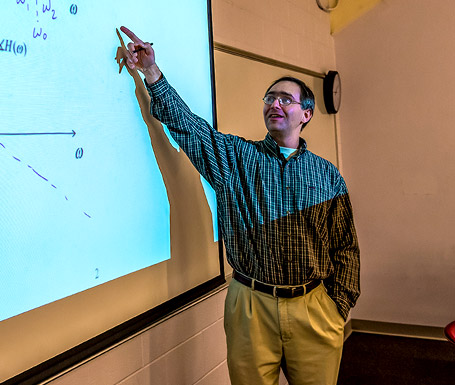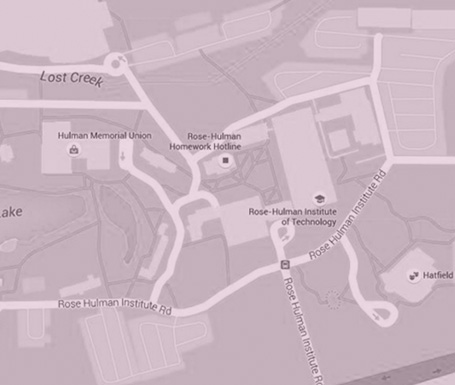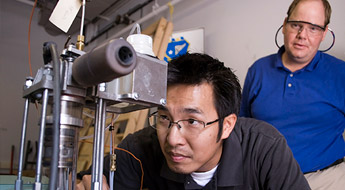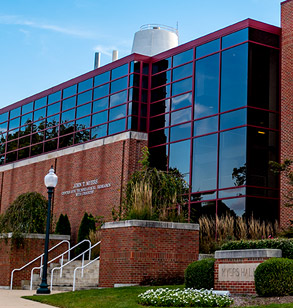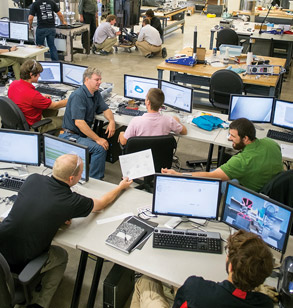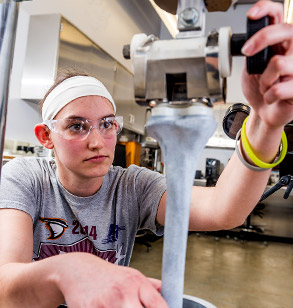Two post-graduate degree programs are offered by the Electrical and Computer Engineering Department at Rose-Hulman Institute of Technology: the Master of Science in Electrical Engineering (MSEE) degree, that requires a thesis and a publication, and the Master of Electrical and Computer Engineering (MECE) degree that does not require a thesis or a publication, but instead requires 12 credit hours of additional course work.
Both degree programs combine mathematics, physics, engineering, and computer science to meet the demands of the highly volatile field of electrical and computer engineering. A student's plan of study for the MSEE degree is arranged by the student, the student's advisory committee chairperson, and the student's advisory committee. The MSEE student's advisory committee must consist of at least (1) an RHIT ECE faculty member serving as the major advisor who guides the student's thesis research, (2) a second RHIT ECE faculty member, and (3) an RHIT faculty member from outside of the ECE department. Similarly, an MECE student's plan of study is arranged on an individual basis through a joint agreement between the student and his or her academic advisor, who must be a member of the RHIT ECE faculty.
Both degree programs seek to build upon the basic foundations established by the student's undergraduate course of study. The student's plan of study may reflect a desire to concentrate on a specialized interest or a desire for a better understanding of the broad underlying theories of the entire profession.
Special areas of interest within the Electrical and Computer Engineering Department include Communications, Computer Architecture and Microcomputers, Control Systems and Robotics, Electromagnetics, Electronics, MEMS, Power Systems, and Signal and Image Processing.
The objective of both programs, the Master of Electrical and Computer Engineering and Master of Science in Electrical Engineering, is to prepare graduates for early career advancement in the field of Electrical and Computer Engineering by building upon their undergraduate training with advanced coursework and concentrated study of problems and topics relevant to the field.
Graduates of the MECE and MSEE programs will have the ability to...
1. develop behavioral models of electrical/computing systems or devices using theory, measurement, simulation, or physical understanding;
2. analyze and/or design systems by synthesizing foundational knowledge as appropriate;
3. solve open-ended/ill-defined problems by identifying requirements, learning independently, and evaluating the quality and feasibility of solutions.
Graduates of the MSEE program will have the ability to...
4. compile and describe previous work related to the thesis topic
5. demonstrate to the engineering community how their original work contributes to the field through written and verbal communication.
Master of Science in Electrical Engineering (MSEE) requirements
- 48 credit hours, 36 credit hours of course work as approved by the student's advisory committee.
- At least 24 credit hours must be upper-level ECE courses (ECE4xx or ECE5xx)
- No more than 12 credit hours of 400-level classes can count toward the MSEE degree.
- 12 credit hours of thesis work (the Institute's non-thesis option is not permitted for the MSEE degree).
- Successful defense of thesis.
Master of Electrical and Computer Engineering (MECE) degree requirements
- 48 credit hours of course work as approved by the student's academic advisor.
- At least 32 credit hours must be upper-level ECE courses (ECE4xx or ECE5xx).
- No more than 12 credit hours of 400-level classes can count toward the MECE degree.
ECE Graduate Course Offerings
Communications
- ECE 412 Software Defined Radio
- ECE 414 Wireless Systems
- ECE 510 Error-Correcting Codes
- ECE 511 Data Communications
- ECE 512 Probability, Random Processes, and Estimation
Computer Architecture and Microcomputers
- ECE 433 Advanced Digital System Design with Verilog HDL
- ECE 434 Embedded Linux
- ECE 530 Advanced Microcomputers
- ECE 534 Advanced Signal and Power Integrity
- ECE531 Digital Test and Product Engineering
- ECE 532 Advanced Topics in Computer Architecture
- ECE 497 CUDA Programming on GPU
- ECE 597 Internet of Things
Control Systems and Robotics
- ECE 420 Discrete-Time Control Systems
- ECE 425 Introduction to Mobile Robotics
Electromagnetics
- ECE 540 Antenna Engineering
- ECE 541 Microwave/Millimeter Wave
- ECE 542 Advanced Electromagnetics
- ECE 597 Electromagnetic Metamaterials
Electronics and MEMS
- ECE 452 Power Electronics
- ECE 454 System Level Analog Electronics
- ECE 516 Introduction to MEMS
- ECE 519 Advanced MEMS
- ECE 551 Digital Integrated Circuit Design
- ECE 552 Analog Integrated Circuit Design
- ECE 553 Radio Frequency Integrated Circuit Design
- ECE 556 Power Electronics: DC Power Supplies
- ECE 557 Analog Test and Product
- ECE 558 Mixed Signal Test Product Engineering
Power Systems
- ECE 452 Power Electronics
- ECE 470 Power Systems I
- ECE 471 Industrial Power Systems
- ECE 472 Power Systems II
- ECE 473 Control of Power Systems
Signal and Image Processing
- ECE 480 Introduction to Image Processing
- ECE 481 Electronic Music Synthesis
- ECE 483 DSP System Design
- ECE 580 Digital Signal Processing
- ECE 582 Advanced Image Processing
- ECE 584 Medical Imaging Systems

